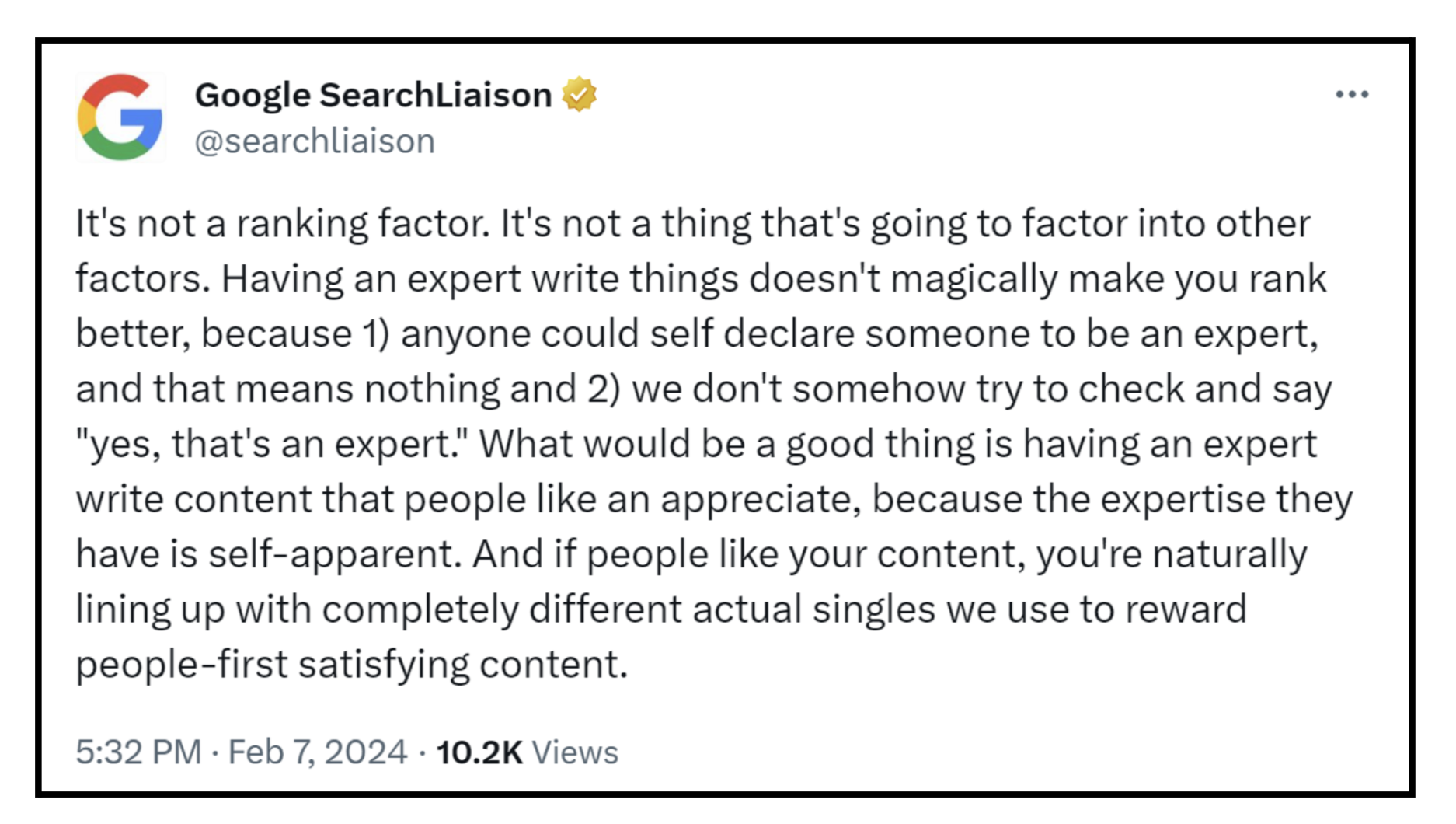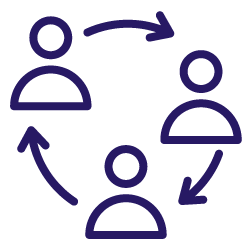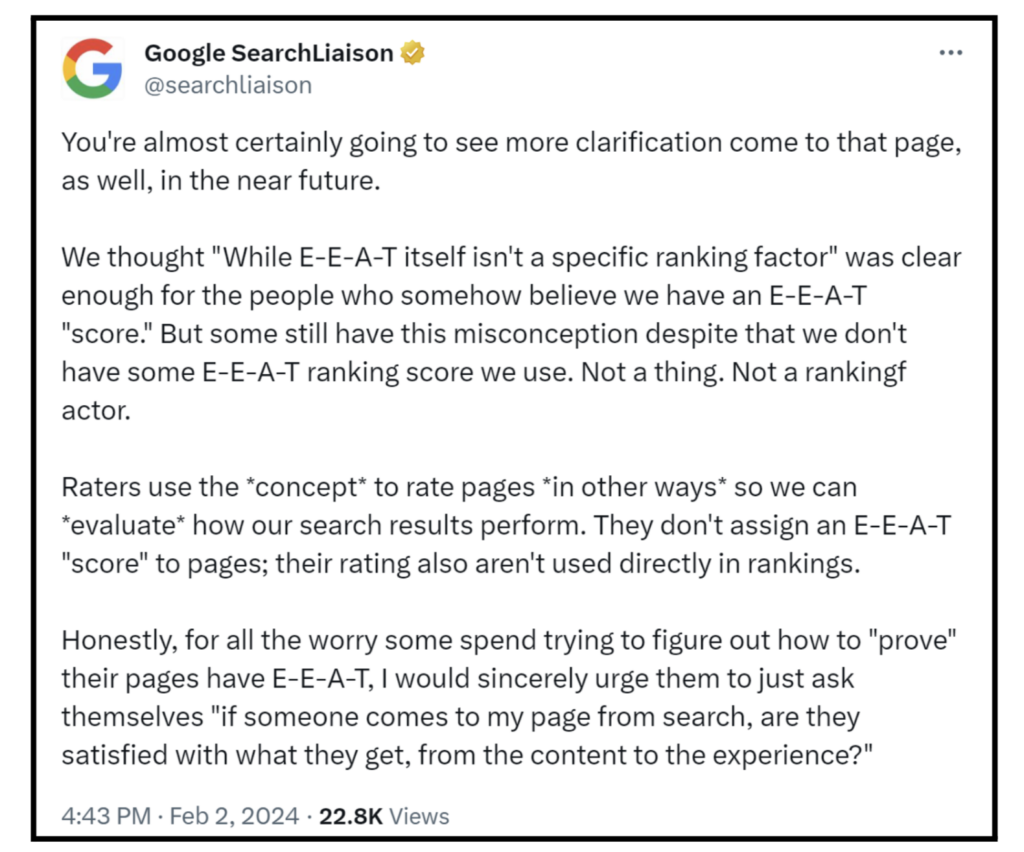First things first, let’s just get this out of the way before we continue.
Is E-E-A-T a ranking factor? No. Google themselves have confirmed this.
Does that mean it should be disregarded? Again, no; another fact that Google has confirmed.
That being said, then how on earth is an SEO meant to work out exactly how important E-E-A-T is? Well, that’s a little more complicated.
Personally speaking, I would go as far to say that in 2024, if you don’t have at least one eye on E-E-A-T as an SEO, then you’re behind the times.
If you want to play catch up before we delve into the heart of the matter, and there’s no shame in that, then it’s definitely worth checking out an excellent blog post from Olaf Kopp on why simple SEO is no longer enough.
You are what you E-E-A-T: How and why does it matter
Once you’ve wrapped your head around the acronym, you know that your site needs to demonstrate all these elements. But, considering they are mostly conceptual and there is no magic checklist, you might be feeling a bit overwhelmed. That’s entirely understandable.
The whole idea that E-E-A-T seems to operate on “vibes” rather than a tangible list of site modifications is frustrating, BUT when you think about it it makes sense.
Think of a website as a person, and then imagine you’re meeting that person for the first time – maybe as a potential business hire. You’re going to want to know this person is the right fit for your business and you’ll probably follow some traditional steps to do so.
First, it’s likely that you will look at their CV. However, anyone can write anything on a CV…mine for example claims I am organized.
Next, to go a step further, you might check out their LinkedIn profile. This would be particularly important if you’re recruiting for a more senior position, in which case you’re looking for someone with some authority.
If their CV lists important qualifications, you might want to see certificates to verify that they have the right expertise.
Moreover, they may have worked with similar businesses to yours in the past, so more than likely, you will reach out to their previous employers for a reference to understand their experience.
And, once you’ve made it through the aforementioned steps and the person fits your criteria, you will almost always invite them to do an interview. Be it online or in person, the interview helps you get a sense of who they are, whether they feel trustworthy and if you get a positive feeling about this person: what those who work in branding call sentiment.
E-E-A-T represents a lot more than just a website’s CV, it encompasses a lot of steps and that help users determine if and how they wish to “collaborate” with a site. There is often a lot to consider and you’ll probably need some help to manage all the moving parts.
Let’s take a look at some useful resources.
Ally one: Your brand
Do you have an in-house brand team? These guys are likely your unsung E-E-A-T heroes. They will be in charge of the tone of voice of your website and the guardian of the brand narrative.
This narrative or back story is crucial in demonstrating why you are the experts in your niche and why you have the experience and authority to dominate the SERPs in your sector.
They can help ensure that your on page content stays on message and fully demonstrates your brand authority in a consistent and trustworthy way.
They should be your go to in order to litmus test any updates to an “About us” page. They should also be able to support and guide your subject matter experts when creating their biographies, author profiles, and byline images.
All of the above leads us, quite neatly, to personal branding. Your subject matter experts might have the most polished author profiles, listing all the different ways they are an expert, but this is the time to show, not tell. Think about how you can provide evidence of their expertise both on page and off page.
Ally two: Social media
You may have a preconceived idea about what your social media team does. After all, every time you see them they have a camera in-hand and are gathering content or they may even be trying to encourage you to do a funny dance for TikTok. But, shelve those ideas because these guys are the E-E-A-T G.O.A.Ts.
Next to your brand team, your social media team is the next step when it comes to defining narrative and brand voice. The expertise, authority and experience you’re working hard to demonstrate on page, they’re doing the same across your brand’s social channels. So, you want to ensure everyone is aligned. After all, an active social media presence is a great way to be accessible to your consumer, building that all important trust.
[Case Study] How Unilever’s recipe platform puts SEO first
The social media team can also work with your subject matter experts to ensure their own social profiles match up with the experience and expertise highlighted on site. After all, there is no point linking from an author page to your author’s LinkedIn profile if they haven’t updated their account since they left college or their job title doesn’t match what’s on your site.
When we talk about social media, we’re not just referring to LinkedIn and Twitter accounts. These days, with the huge rise in popularity (and searchability) of short form video platforms, such as TikTok or Youtube Shorts, your on-page experts now have a different outlet to share snippets of their expertise. This again helps to build brand authority for both themselves and your website. It’s a win-win situation, your social media team needs content and you need to build authority and trust.
Ally three: Outreach and digital PR
Now that you’ve mastered those on page and social trust signals, what’s next? Well, you need to start spreading the good E-E-A-T vibes further across the web, and this is where your outreach and digital PR teams come in.
It’s important that these teams already have a strong understanding of your SEO goals. They may even be part of your SEO team already?
Obviously building links and brand mentions is their main M.O., but they should also be aware of how important they can be for E-E-A-T.
They can take your on page authors and subject matter experts and turn them into real, bonafide industry thought leaders.
For example, say you have an excellent site about volcanoes, written by volcanologists. Step one, make sure your site includes biographies that explain why and how they are experts in their field.
At the first rumblings of an impending eruption, you’ll want your outreach and digital PR teams on hand. Any journalists writing about a volcanic activity will be in search of volcano experts to provide insight and analysis to support their stories. Yes, of course this type of newsjacking is an excellent way to land links and mentions, but it’s so much more than that.
It’s also about continuing to reinforce your website’s and your experts’ brand. The best thing about all this? It has a snowball effect, the more you do it, the more you become known as the go to volcano guys. As such, the press and internet users will progressively look to you first for any volcano related information. It’s a reliable way to promote your expertise, experience, authority and trustworthiness in your specific niche.
Do I really need to involve all these people or can I turn to AI?
You may be thinking that all of the above seems awfully complex and, worse, it involves collaborating with a lot of other people. As I said before, it requires managing a lot of moving parts.
Furthermore, you may also be wondering if you can avoid all this human interaction and instead employ a trusty AI sidekick to solve some of your E-E-A-T problems. Some AI could prove helpful in writing author biographies or, taking it even further, they could even conjure up a great “expert” out of thin air along with their auto generated headshot, hopefully one without too many teeth.
In fact, this is the exact reason that E-E-A-T isn’t a ranking factor.

Source : X (formerly Twitter)
Simply put, the advent of AI programs like chatGPT and MidJourney have made it too easy to “create” experts. Sprinkle in a few made up qualifications, even a fraudulent LinkedIn profile and it can be hard to distinguish what’s real and what’s fake.
Even more concerning, some (of course, not you) might even be tempted to double down on the deceit and use this expert to share their experience with the press.
While some who have tried have been able to fool Google (for now, it’s highly unlikely that will last long), it’s very difficult to fool humans in this way.
If you do this and get found out, then all trust is gone and then you’ll likely need that PR and brand team to handle the PR crisis that you’ve caused.
Aside from being unethical, it is also a short term fix for a long term problem, and it won’t help endear you to your site visitors or Google.
Final thoughts: E-E-A-T is possible, but better with the others
While it’s possible to implement many of the E-E-A-T basics alone as an SEO, as the old saying goes there is no I in team and there is no I in E-E-A-T.
In order to rise above your competitors in the SERPs you’re going to need to lean on the experience and expertise of your fellow marketers.
This collaborative approach can ensure that you’ve demonstrated E-E-A-T across the board in a way that Google, but more importantly, consumers can easily sense when they land on your site.



